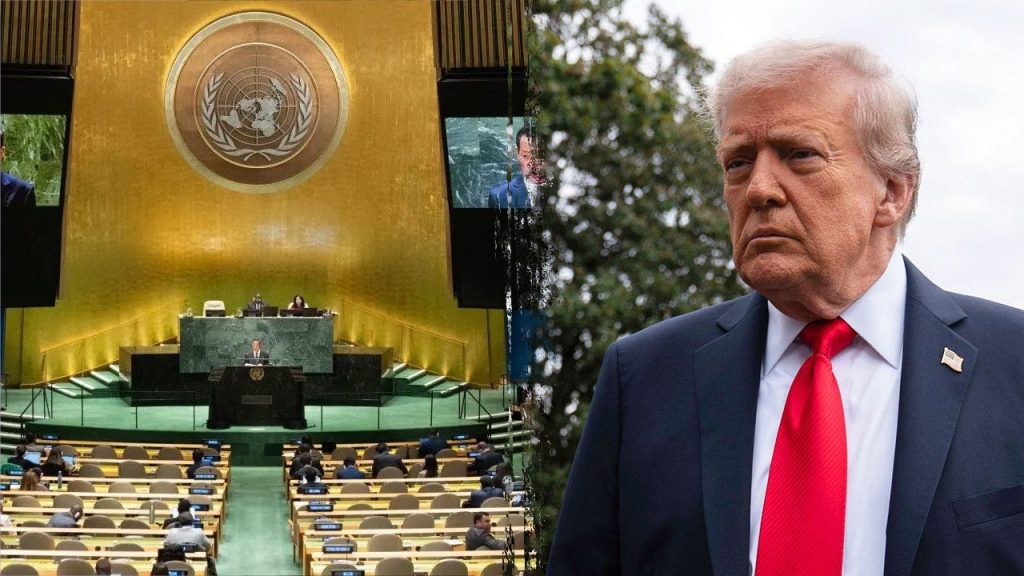Trump’s UN Address: Strength, Peace, and a Critique of Globalism
A Return to American Strength on the World Stage
President Donald Trump is preparing to deliver his first United Nations General Assembly address of his second administration, focusing on what a White House official described as the “return of American strength.” The speech, scheduled for Tuesday morning in New York City, will highlight Trump’s peace-making efforts while offering a direct critique of globalist ideologies. According to the exclusive preview provided to Fox News Digital, the president intends to present himself as having “effectively restored American strength on the world stage” through diplomatic achievements that previous administrations failed to accomplish. This address represents a significant moment for Trump to articulate his foreign policy vision to the international community, emphasizing a perspective that places American interests at the forefront while still engaging with global challenges on his terms.
Highlighting Peace Achievements Across Multiple Continents
The president plans to showcase several diplomatic breakthroughs his administration has facilitated in regions with longstanding conflicts. Among these are peace negotiations between Armenia and Azerbaijan, which ended a decades-long territorial dispute; agreements between Thailand and Cambodia; and conflict resolution efforts between Rwanda and the Democratic Republic of Congo. These diplomatic initiatives, according to White House officials, demonstrate Trump’s ability to broker peace “on a scale that no other president has accomplished.” By emphasizing these successes, Trump aims to position himself as a peacemaker who employs American power and influence strategically to resolve international disputes that previous administrations and global institutions have struggled to address effectively. This narrative contrasts with criticisms of his approach to foreign policy during his first term, when some international leaders expressed concern about American disengagement from multilateral institutions.
Decisive Action Against Narcoterrorism and Iran’s Nuclear Program
Beyond diplomatic achievements, Trump will highlight recent military operations that demonstrate his administration’s willingness to use force in targeted ways. The president recently authorized multiple strikes against Venezuelan drug trafficking operations in the Caribbean, including a military action that destroyed a vessel linked to the Tren de Aragua criminal organization, leaving several suspected narcoterrorists dead. Trump has framed these operations as necessary measures to prevent dangerous narcotics from reaching American communities. Additionally, the speech will reference “Operation Midnight Hammer,” described as the largest B-2 operational strike in history, which targeted Iran’s nuclear facilities in June. According to U.S. assessments, these precision strikes successfully “destroyed” and “badly damaged” critical infrastructure at these sites, an evaluation reportedly confirmed by both Iranian and Israeli sources. These military actions reflect Trump’s preference for decisive, unilateral action on security threats that he perceives as directly affecting American interests.
A Critique of Globalism and International Institutions
A significant portion of Trump’s address will deliver what officials characterized as “blunt, tough talk about the failures of globalism.” The president plans to criticize international approaches to migration, energy policy, and climate change, arguing that these globalist ideologies threaten to undermine successful nations. This critique aligns with Trump’s longstanding skepticism toward multilateral institutions and international agreements that he believes constrain American sovereignty or disadvantage American economic interests. In a pointed challenge to the United Nations itself, a White House official indicated Trump will implicitly contrast his peace achievements with the UN’s efficacy, asking rhetorically: “As the president delivers peace in major conflicts around the world, what has the United Nations been doing?” This framing positions Trump as a more effective peacemaker than the international body whose assembly he is addressing, underscoring his preference for bilateral diplomacy and direct American engagement rather than working through multilateral frameworks.
America as “Defender of Western Civilization”
The president is expected to position the United States as a “defender of western civilization” in his speech, a framing that echoes themes from his previous addresses and campaign rhetoric. This characterization suggests Trump views America’s global role not merely in terms of national interest but as the protector of a particular set of cultural and political values. While specific details about this portion of the speech weren’t provided in the preview, this framing typically involves emphasizing traditional values, national sovereignty, and a more restrictive approach to immigration and trade policies. By casting America’s international role in these terms, Trump presents an alternative vision to the more cosmopolitan, multilateral approach often associated with the United Nations and other international institutions. This perspective frames global engagement not as an end in itself but as a means to preserve and protect a particular conception of Western democratic values and American identity.
A Packed Diplomatic Schedule Following the Address
Following his United Nations speech, Trump has scheduled meetings with several world leaders, demonstrating the administration’s ongoing diplomatic engagement despite its critique of multilateral institutions. These planned encounters include discussions with UN Secretary-General António Guterres, Ukrainian President Volodymyr Zelenskyy, Argentine President Javier Milei, and European Commission President Ursula von der Leyen. Additionally, Trump will participate in a multilateral meeting with leaders from Qatar, Jordan, Turkey, Pakistan, Indonesia, Egypt, the UAE, and Saudi Arabia. This extensive diplomatic schedule suggests that while Trump may criticize aspects of the international system in his speech, his administration remains actively engaged in both bilateral and multilateral diplomacy. These meetings will likely focus on regional security challenges, trade relationships, and ongoing conflicts, including Russia’s war in Ukraine and tensions in the Middle East. The balance between Trump’s critique of globalism and his active diplomatic engagement reflects the complex reality of American foreign policy in an interconnected world, where even an “America First” approach requires substantial international cooperation and dialogue.


